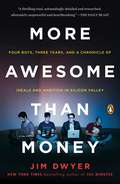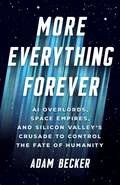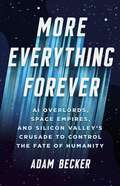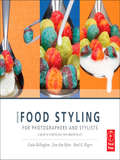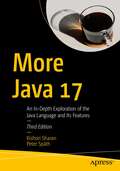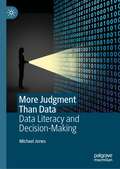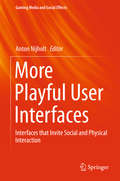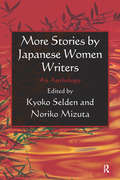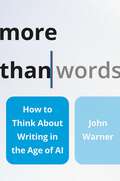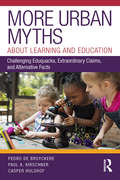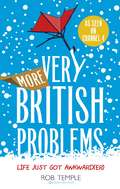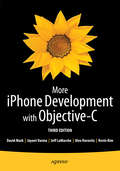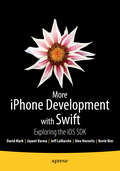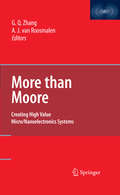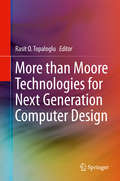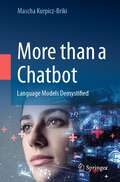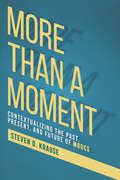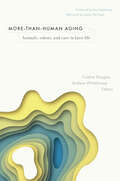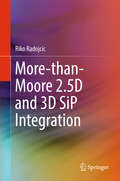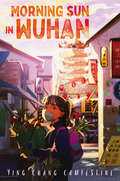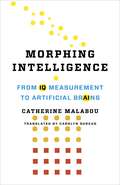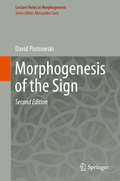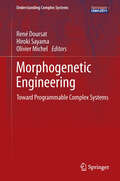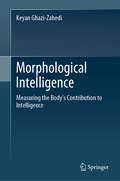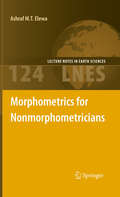- Table View
- List View
More Awesome Than Money
by Jim DwyerThe David-versus-Goliath effort to build a revolutionary social network that would give us back control of our personal data In June of 2010, four nerdy NYU undergrads moved to Silicon Valley to save the world from Facebook. Their idea was simple--to build a social network that would allow users to control the information they shared about themselves instead of surrendering it to big business. Their project was called Diaspora, and just weeks after launching it on Kickstarter, the idealistic twenty-year-olds had raised $200,000 from donors around the world. Profiled in the New York Times, wooed by venture capitalists, and cheered on by the elite of the digital community, they were poised to revolutionize the Internet and remap the lines of power in our digital society--until things fell apart, with tragic results.The story of Diaspora reaches far beyond Silicon Valley to today's urgent debates over the future of the Internet. In this heartbreaking yet hopeful account, drawn from extensive interviews with the Diaspora Four and other key figures, Pulitzer Prize-winning journalist Jim Dwyer tells a riveting tale of four ambitious and naive young men who dared to challenge the status quo.
More Everything Forever: AI Overlords, Space Empires, and Silicon Valley's Crusade to Control the Fate of Humanity
by Adam BeckerThe bad science and sinister ideas behind Silicon Valley's foolish obsession with immortality, AI paradise and limitless growth.Tech billionaires have decided that they should determine our futures for us. According to Elon Musk, Jeff Bezos, Sam Altman and more, the only good future for humanity is one powered by technology: trillions of humans living in space, functionally immortal, served by superintelligent AIs.In More Everything Forever, scientist and writer Adam Becker investigates these wildly implausible and often profoundly immoral visions of tomorrow to reveal why, in reality, there is no good evidence that they will, or should, come to pass. The giants of Silicon Valley claim that their ideas are based on science, but the truth is darker: they come from a jumbled mix of shallow futurism and racist pseudoscience. And behind these fanciful visions of space colonies and digital immortality is a cynical power grab, at the expense of essential work spent on solving real problems like the climate crisis.More Everything Forever exposes the powerful myths that dominate Silicon Valley, challenging us to see how foolish, and dangerous, these visions of the future are.
More Everything Forever: AI Overlords, Space Empires, and Silicon Valley's Crusade to Control the Fate of Humanity
by Adam BeckerThis "wild and utterly engaging narrative" (Melanie Mitchell) shows why Silicon Valley&’s heartless, baseless, and foolish obsessions—with escaping death, building AI tyrants, and creating limitless growth—are about oligarchic power, not preparing for the future Tech billionaires have decided that they should determine our futures for us. According to Elon Musk, Jeff Bezos, Sam Altman, and more, the only good future for humanity is one powered by technology: trillions of humans living in space, functionally immortal, served by superintelligent AIs. In More Everything Forever, science journalist Adam Becker investigates these wildly implausible and often profoundly immoral visions of tomorrow—and shows why, in reality, there is no good evidence that they will, or should, come to pass. Nevertheless, these obsessions fuel fears that overwhelm reason—for example, that a rogue AI will exterminate humanity—at the expense of essential work on solving crucial problems like climate change. What&’s more, these futuristic visions cloak a hunger for power under dreams of space colonies and digital immortality. The giants of Silicon Valley claim that their ideas are based on science, but the reality is darker: they come from a jumbled mix of shallow futurism and racist pseudoscience. More Everything Forever exposes the powerful and sinister ideas that dominate Silicon Valley, challenging us to see how foolish, and dangerous, these visions of the future are.
More Food Styling for Photographers & Stylists: A guide to creating your own appetizing art
by Linda Bellingham Jean Ann BybeeThanks to the exploding popularity of food-based television shows (entire networks, even), websites, books, and magazines, food stylists and food photographers are in more demand today than ever before. While there are many amazing opportunities for creative professionals to showcase their work in ads, cookbooks, blogs, and food packaging, there is also more competition for these jobs. Whether you are a food stylist who works alongside photographers or a food photographer yourself, you'll find everything you need to know to give your portfolio that little extra push in this expert guide by three professionals with decades of experience in each field. More Food Styling for Photographers covers topics that Linda, Jean Ann, and Brad's fans have been asking for, such as shooting food on location, working with packaged foods, building the perfect breakfast shot, and more. Clients and foodies eat with their eyes first, so don't be afraid to play with your food - make sure it's YOUR image that whets their appetite!
More Java 17: An In-Depth Exploration of the Java Language and Its Features
by Kishori Sharan Peter SpäthWork with the essential and advanced features of the Java 17 release. This book covers features such as annotations, reflection, and generics. These topics are then complemented by details of how to use lambda expressions, allowing you to build powerful and efficient Java programs. Furthermore, added to this edition you'll find topics on network programming, Java RMI, the process API, and custom runtime images. The authors provide a multitude of diagrams and complete programs to help you visualize and better understand the topics covered in this book. More Java 17, Third Edition starts with a series of chapters on the essential language features provided by Java before moving on to Java module development and packaging, and improved interop with other languages. After reading this book, you'll have the know-how of a professional Java programmer and be able to tackle most projects with confidence.This book's source code can be accessed at github.com/Apress/more-java-17. What You Will Learn Use essential and advanced features of the Java languageCode Java annotationsWork with reflection and generics Manage streams with the Stream API Who This Book Is For Those new to Java programming who are continuing the Java learning journey; it is recommended that you read an introductory Java programming book first, such as Java 17 for Absolute Beginners, from Apress.
More Judgment Than Data: Data Literacy and Decision-Making
by Michael JonesMore data has been produced in the 21st century than all of human history combined. Yet, are we making better decisions today than in the past? How many poor decisions result from the absence of data? The existence of an overwhelming amount of data has affected how we make decisions, but it has not necessarily improved how we make decisions. To make better decisions, people need good judgment based on data literacy—the ability to extract meaning from data. Including data in the decision-making process can bring considerable clarity in answering our questions. Nevertheless, human beings can become distracted, overwhelmed, and even confused in the presence of too much data. The book presents cautionary tales of what can happen when too much attention is spent on acquiring more data instead of understanding how to best use the data we already have. Data is not produced in a vacuum, and individuals who possess data literacy will understand the environment and incentives in the data-generating process. Readers of this book will learn what questions to ask, what data to pay attention to, and what pitfalls to avoid in order to make better decisions. They will also be less vulnerable to those who manipulate data for misleading purposes.
More Playful User Interfaces
by Anton NijholtThis book covers the latest advances in playful user interfaces - interfaces that invite social and physical interaction. These new developments include the use of audio, visual, tactile and physiological sensors to monitor, provide feedback and anticipate the behavior of human users. The decreasing cost of sensor and actuator technology makes it possible to integrate physical behavior information in human-computer interactions. This leads to many new entertainment and game applications that allow or require social and physical interaction in sensor- and actuator-equipped smart environments. The topics discussed include: human-nature interaction, human-animal interaction and the interaction with tangibles that are naturally integrated in our smart environments. Digitally supported remote audience participation in artistic or sport events is also discussed. One important theme that emerges throughout the book is the involvement of users in the digital-entertainment design process or even design and implementation of interactive entertainment by users themselves, including children doing so in educational settings.
More Stories by Japanese Women Writers: An Anthology
by Kyoko SidenThis anthology introduces sixteen modern Japanese women writers spanning a century in time and a wide range of life circumstances and literary styles. No other collection offers usch a diversity of women's voices
More Than Words: How to Think About Writing in the Age of AI
by John WarnerA veteran writing teacher makes a &“moving&” (Rick Wormeli) argument that writing is a form of thinking and feeling and shows why it can&’t be replaced by AI In the age of artificial intelligence, drafting an essay is as simple as typing a prompt and pressing enter. What does this mean for the art of writing? According to longtime writing teacher John Warner: not very much.More Than Words argues that generative AI programs like ChatGPT not only can kill the student essay but should, since these assignments don&’t challenge students to do the real work of writing. To Warner, writing is thinking—discovering your ideas while trying to capture them on a page—and feeling—grappling with what it fundamentally means to be human. The fact that we ask students to complete so many assignments that a machine could do is a sign that something has gone very wrong with writing instruction. More Than Words calls for us to use AI as an opportunity to reckon with how we work with words—and how all of us should rethink our relationship with writing.
More Urban Myths About Learning and Education: Challenging Eduquacks, Extraordinary Claims, and Alternative Facts
by Paul A. Kirschner Pedro De Bruyckere Casper HulshofMore Urban Myths About Learning and Education: Challenging Eduquacks, Extraordinary Claims, and Alternative Facts examines common beliefs about education and learning that are not supported by scientific evidence before using research to reveal the truth about each topic. The book comprises sections on educational approaches, curriculum, educational psychology, and educational policy, concluding with a critical look at evidence-based education itself. Does playing chess improve intelligence? Should tablets and keyboards replace handwriting? Is there any truth to the 10,000-hour rule for expertise? In an engaging, conversational style, authors Pedro De Bruyckere, Paul A. Kirschner, and Casper Hulshof tackle a set of pervasive myths, effectively separating fact from fiction in learning and education.
More Very British Problems
by Rob TempleDo you . . .Carry emergency teabags in your backpack?Quietly tut at badly formed 'queues'?Cleverly avoid blisters by wearing socks with your sandals?. . . then you may be suffering from (more) VERY BRITISH PROBLEMS.In this sequel to the original and quite-funny-if-you-like-that-sort-of-thing Very British Problems book, Rob Temple is taking us out of our comfort zone. We're going to that worrying place where crisps don't taste quite the same - and where ordering chips gets you . . . well, crisps. We're going abroad. Whether you're in Magaluf or the Maldives, indulging in après ski or Aperol, no one is immune to the raging superbug that is Very British Problems.Previously published as Very British Problems Abroad.
More iPhone Development with Objective-C
by Alex Horovitz David Mark Jayant Varma Jeff Lamarche Kevin KimIf you are looking to extend your iOS programming skills beyond the basics then More iPhone Development with Objective-C is for you. Authors Dave Mark, Jayant Varma, Jeff LaMarche, Alex Horovitz, and Kevin Kim explain concepts as only they can--with code snippets you can customize and use, as you like, in your own apps. More iPhone Development with Objective-C is an independent companion to Beginning iPhone Development with Objective-C. That is, it is a perfect second book, but it is also a great book for those looking to improve their skills who have already programmed for iOS. In particular it includes a series of chapters devoted to Core Data, the standard for Apple persistence. The authors carefully step through each Core Data concept and show techniques and tips specifically for writing larger apps--offering a breadth of coverage you won't find anywhere else. More iPhone Development with Objective-C covers a variety of other topics, including Multipeer Connectivity's relatively simple Bluetooth/WiFi peer-to-peer model, MapKit, and media library access and playback so that your applications can utilize media on your users' computer. You'll also find coverage of Interface Builder, Live Previews and Custom Controls and some advanced techniques for debugging your applications. The book is filled with useful topics that will bring your programs up-to-date with the new functionality built into iOS. What you'll learn How to embed maps with Map Kit and use in-application email How to access a user's iPod music library and integrate music into apps Working with data from the web and the cloud, including Apple's iCloud Using the Camera to integrate into your apps, scan and create barcodes Live previews from Interface Builder to create custom components and frameworks Who this book is for This book serves as a complementary book to More iOS 6 Development: Further Explorations of the iOS SDK and is suitable for those aspiring app developers new to iPad app development. Prior Objective-C programming experience would be helpful, but not required. Table of Contents Chapter 1: Here We Go Round Again Chapter 2: Core Data, What, Why and How Chapter 3: A Super Start Chapter 4: The Devil in the Detail View Chapter 5: Preparing for Change: Migrations and Versioning Chapter 6: Custom Managed Objects Chapter 7: Relationships, Fetched Properties, and Expressions Chapter 8: Behind Every iCloud Chapter 9: Peer-to-Peer Over Bluetooth Using Multipeer Connectivity Chapter 10: MapKit Chapter 11: Messaging: Mail, Social, and iMessage Chapter 12: Media Library Access and Playback Chapter 13: Lights, Camera and Action Chapter 14: Interface Builder and Storyboards Chapter 15: Unit Testing, Debugging, and Instruments Chapter 16: The Road Goes Ever On
More iPhone Development with Swift
by Alex Horovitz David Mark Jayant Varma Jeff Lamarche Kevin KimInterested in iPhone and iPad apps development? Want to learn more? Whether you are a relative newcomer to iPhone and iPad or iOS development or an old hand looking to expand your horizons, we have the perfect Swift-flavored book for you. (Source code has been updated to reflect Xcode 6. 3. 2 and Swift 1. 2!) The update to the bestselling More iPhone Development by Dave Mark and Jeff LaMarche, More iPhone Development with Swift digs deeper into the new Apple Swift programming language and iOS 8 SDK, explaining complex concepts and techniques in the same friendly, easy-to-follow style you've come to expect. More iPhone Development with Swift covers topics like Swift, Core Data, peer-to-peer networking using Multipeer Connectivity, working with data from the web, MapKit, in-application e-mail, Camera Live-Previews integration, Barcode scanning and more. All the concepts and APIs are clearly presented with code snippets you can customize and use, as you like, in your own apps. You'll journey through coverage of concurrent programming and some advanced techniques for debugging your applications. What you'll learn All about Swift, Core Data: key concepts and techniques for writing larger applications How to leverage the new Swift programming language with the new iOS SDK How to utilize a variety of networking mechanisms, including peer-to-peer connections over Bluetooth/WiFi using Multipeer Connectivity Essentials of concurrent programming and advanced debugging techniques Tips on working with data from the web and the cloud, including Apple's iCloud Who this book is for This book is a perfect more advanced companion to Beginning iPhone Development with Swift. So, this book is for those who have some experience with Swift and the iOS SDK already and for readers of the Beginning iPhone Development book. Table of Contents Chapter 1: Here We Go Round Again Chapter 2: Core Data, What, Why and How Chapter 3: A Super Start Chapter 4: The Devil in the Detail View Chapter 5: Preparing for Change: Migrations and Versioning Chapter 6: Custom Managed Objects Chapter 7: Relationships, Fetched Properties, and Expressions Chapter 8: Behind Every iCloud Chapter 9: Peer-to-Peer Over Bluetooth Using Multipeer Connectivity Chapter 10: MapKit Chapter 11: Messaging: Mail, Social, and iMessage Chapter 12: Media Library Access and Playback Chapter 13: Lights, Camera and Action Chapter 14: Interface Builder and Storyboards Chapter 15: Unit Testing, Debugging, and Instruments Chapter 16: The Road Goes Ever On
More than Moore
by Alfred Van Roosmalen Guo Qi ZhangIn the past decades, the mainstream of microelectronics progression was mainly powered by Moore's law focusing on IC miniaturization down to nano scale. However, there is a fast increasing need for "More than Moore" (MtM) products and technology that are based upon or derived from silicon technologies, but do not simply scale with Moore's law. This book provides new vision, strategy and guidance for the future technology and business development of micro/nanoelectronics.
More than Moore Technologies for Next Generation Computer Design
by Rasit O. TopalogluThis book provides a comprehensive overview of key technologies being used to address challenges raised by continued device scaling and the extending gap between memory and central processing unit performance. Authors discuss in detail what are known commonly as "More than Moore" (MtM), technologies, which add value to devices by incorporating functionalities that do not necessarily scale according to "Moore's Law". Coverage focuses on three key technologies needed for efficient power management and cost per performance: novel memories, 3D integration and photonic on-chip interconnect.
More than a Chatbot: Language Models Demystified
by Mascha Kurpicz-BrikiRecent technological advances have resulted in a new generation of powerful text processing and generation tools, that produce text very similar to what a human could do. Such tools have the potential to change the way we work, learn and teach – and this book enables you to understand and be part of this exciting development. Did you wonder how tools like ChatGPT or Bard work, but do not have a technical background? Then this is the right book for you! To discuss and better understand what such technologies are capable of and how this will impact our lives and our society, a basic background knowledge about text processing and generation technologies is required. In particular, the book discusses the following questions: How did the field of automated text processing and generation evolve over the last years, and what happened to allow the incredible recent advances? Are chatbots such as ChatGPT or Bard truly understanding humans? What pitfalls exist and how are stereotypes of the society reflected in such models? What is the potential of such technology, and how will the digital society of the future look like in terms of human-chatbot-collaboration? The book is aimed for a general audience, briefly explaining mathematical or technical background when necessary. After having read this book, you will be confident to participate in public discussions about how this new generation of language models will impact society. You will be aware of the risks and pitfalls these technologies can bring along, and how to deal responsibly when making use of tools built from AI technology in general.
More than a Moment: Contextualizing the Past, Present, and Future
by Steven D. KrauseAs recently as 2012, massive open online courses (MOOCs) looked poised to revolutionize higher education, but in just a few years their flaws and problems have made them into a less relevant model. In More than a Moment, Steven D. Krause explores MOOCs and their continuing impact on distance learning in higher education, putting them in the context of technical innovations that have come before and those that will be part of the educational future. Krause writes about his own experiences as a participant in several MOOCs and the experiences of faculty who developed and taught MOOCs. Contrary to many early claims from educational entrepreneurs, they were never entirely “new,” and MOOCs and their aftermath are still at the heart of the tensions between nonprofit universities and for-profit entities, particularly online program management firms, in delivering distance education. While MOOCs are no longer a threat to education in the United States, they are part of the ongoing corporatization of education and remain part of conversations about experienced-based credit, corporate training, and open education. Presenting historical, student, teacher, and administrative perspectives, More than a Moment is a well-rounded treatment that will be of interest to academics and entrepreneurs interested in distance education, online pedagogy, online program management, and public-private partnerships in higher education.
More-than-Human Aging: Animals, Robots, and Care in Later Life (Global Perspectives on Aging)
by Andrew Whitehouse Cristina DouglasWhat does later life look like when it is lived in the companionship of other species? Similarly, how do other species age (or not) with humans, and what sort of (a)symmetries, if any, are brought to light around how we understand and think about aging? So far, aging has been investigated in the social sciences in purely human terms. This is the first collection of original work that considers aging as taking place in relation to other species. This volume aims to start a conversation about aging by taking its more-than-human participants seriously—that is, not only as a support for or context of human aging but also, more symmetrically, as agents and subjects in the process of aging. The contributors draw upon richly descriptive ethnographic accounts, including moments of connection between seniors and dogs in a long-term care facility, human care for aging laboratory animals, and robotic companionship in later life. The ethnographies in this volume not only enrich our understanding of more-than-human companionship during the human aging process but also challenge and urge us to rethink what it means to live later in life in ecologically entangled social and moral worlds.
More-than-Moore 2.5D and 3D SiP Integration
by Riko RadojcicThis book presents a realistic and a holistic review of the microelectronic and semiconductor technology options in the post Moore's Law regime. Technical tradeoffs, from architecture down to manufacturing processes, associated with the 2. 5D and 3D integration technologies, as well as the business and product management considerations encountered when faced by disruptive technology options, are presented. Coverage includes a discussion of Integrated Device Manufacturer (IDM) vs Fabless, vs Foundry, and Outsourced Assembly and Test (OSAT) barriers to implementation of disruptive technology options. This book is a must-read for any IC product team that is considering getting off the Moore's Law track, and leveraging some of the More-than-Moore technology options for their next microelectronic product.
Morning Sun in Wuhan
by Ying CompestineWhat was the pandemic of the century like at the start? This swift, gripping novel captures not only the uncertainty and panic when COVID first emerged in Wuhan, but also how a community banded together. Weaving in the tastes and sounds of the historic city, Wuhan&’s comforting and distinctive cuisine comes to life as the reader follows 13-year-old Mei who, through her love for cooking, makes a difference in her community. Written by an award-winning author originally from Wuhan. Grieving the death of her mother and an outcast at school, thirteen-year-old Mei finds solace in cooking and computer games. When her friend&’s grandmother falls ill, Mei seeks out her father, a doctor, for help, and discovers the hospital is overcrowded. As the virus spreads, Mei finds herself alone in a locked-down city trying to find a way to help. Author Ying Chang Compestine draws on her own experiences growing up in Wuhan to illustrate that the darkest times can bring out the best in people, friendship can give one courage in frightening times, and most importantly, young people can make an impact on the world. Readers can follow Mei&’s tantalizing recipes and cook them at home.
Morphing Intelligence: From IQ Measurement to Artificial Brains (The Wellek Library Lectures)
by Catherine MalabouWhat is intelligence? The concept crosses and blurs the boundaries between natural and artificial, bridging the human brain and the cybernetic world of AI. In this book, the acclaimed philosopher Catherine Malabou ventures a new approach that emphasizes the intertwined, networked relationships among the biological, the technological, and the symbolic.Malabou traces the modern metamorphoses of intelligence, seeking to understand how neurobiological and neurotechnological advances have transformed our view. She considers three crucial developments: the notion of intelligence as an empirical, genetically based quality measurable by standardized tests; the shift to the epigenetic paradigm, with its emphasis on neural plasticity; and the dawn of artificial intelligence, with its potential to simulate, replicate, and ultimately surpass the workings of the brain. Malabou concludes that a dialogue between human and cybernetic intelligence offers the best if not the only means to build a democratic future. A strikingly original exploration of our changing notions of intelligence and the human and their far-reaching philosophical and political implications, Morphing Intelligence is an essential analysis of the porous border between symbolic and biological life at a time when once-clear distinctions between mind and machine have become uncertain.
Morphogenesis of the Sign: From Morphodynamics To Neurosciences (Lecture Notes in Morphogenesis)
by David PiotrowskiThis book develops a morphodynamical approach to linguistic and sign structures as an integrated response to multilevel and interrelated problems in semiolinguistic research. More broadly, the content is linked to the realities of living speech through a connection (via the concept of diacriticity) with the Merleau-Pontian phenomenology, and beyond the formal determinations of a semiolinguistic system and its calculus. Such problems are mainly epistemological (concerning the nature and legitimate scope of semiolinguistic knowledge), empirical (concerning the observational device and the data’s composition), and theoretical (regarding the choice of a conceptual and formalized explicative frame). With regard to theory, the book introduces a morphodynamical architecture of linguistic signs and operations as a suitable mathematization of Saussurean theory. The Husserlian phenomenological signification of this formal apparatus is then established, and, from an empirical standpoint, its compatibility with neurobiological experimental results is discussed.
Morphogenetic Engineering
by René Doursat Hiroki Sayama Olivier MichelGenerally, spontaneous pattern formation phenomena are random and repetitive, whereas elaborate devices are the deterministic product of human design. Yet, biological organisms and collective insect constructions are exceptional examples of complex systems that are both self-organized and architectural. This book is the first initiative of its kind toward establishing a new field of research, Morphogenetic Engineering, to explore the modeling and implementation of "self-architecturing" systems. Particular emphasis is placed on the programmability and computational abilities of self-organization, properties that are often underappreciated in complex systems science--while, conversely, the benefits of self-organization are often underappreciated in engineering methodologies. Altogether, the aim of this work is to provide a framework for and examples of a larger class of "self-architecturing" systems, while addressing fundamental questions such as > How do biological organisms carry out morphogenetic tasks so reliably? > Can we extrapolate their self-formation capabilities to engineered systems? > Can physical systems be endowed with information (or informational systems be embedded in physics) so as to create autonomous morphologies and functions? > What are the core principles and best practices for the design and engineering of such morphogenetic systems? The intended audience consists of researchers and graduate students who are working on, starting to work on, or interested in programmable self-organizing systems in a wide range of scientific fields, including computer science, robotics, bioengineering, control engineering, physics, theoretical biology, mathematics, and many others.
Morphological Intelligence: Measuring the Body’s Contribution to Intelligence
by Keyan Ghazi-ZahediIntelligence results from the interaction of the brain, body and environment. The question addressed in this book is, can we measure the contribution of the body and its' interaction with the environment? To answer this, we first present a comprehensive overview of the various ways in which a body reduces the amount of computation that the brain has to perform to solve a task. This chapter will broaden your understanding of how important inconspicuously appearing physical processes and physical properties of the body are with respect to our cognitive abilities. This form of contribution to intelligence is called Morphological Intelligence. The main contribution of this book to the field is a detailed discussion of how Morphological Intelligence can be measured from observations alone. The required mathematical framework is provided so that readers unfamiliar with information theory will be able to understand and apply the measures. Case studies from biomechanics and soft robotics illustrate how the presented quantifications can, for example, be used to measure the contribution of muscle physics to jumping and optimise the shape of a soft robotic hand. To summarise, this monograph presents various examples of how the physical properties of the body and the body’s interaction with the environment contribute to intelligence. Furthermore, it treats theoretical and practical aspects of Morphological Intelligence and demonstrates the value in two case studies.
Morphometrics for Nonmorphometricians
by Ashraf M.T. ElewaMorphometrics is concerned with the study of variations and change in the form (size and shape) of organisms or objects adding a quantitative element to descriptions and thereby facilitating the comparison of different objects and organisms. This volume provides an introduction to morphometrics in a clear and simple way without recourse to complex mathematics and statistics. This introduction is followed by a series of case studies describing the variety of applications of morphometrics from paleontology and evolutionary ecology to archaeological artifacts analysis. This is followed by a presentation of future applications of morphometrics and state of the art software for analyzing and comparing shape.
